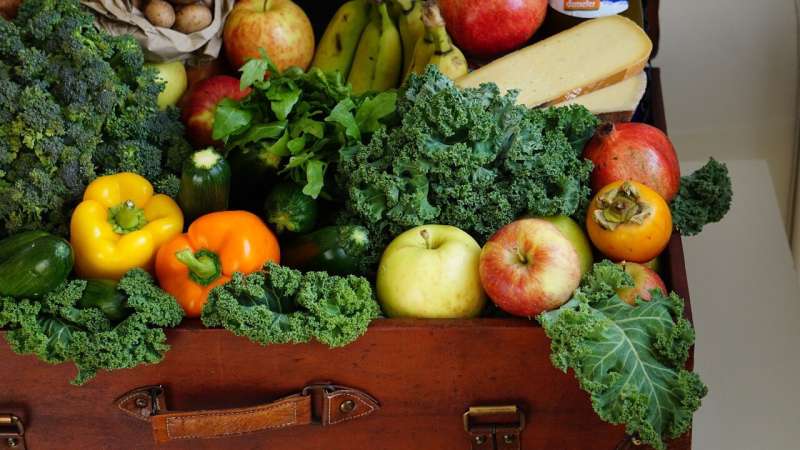Consuming a higher amount of fruits and vegetables could result in the ideal amount of sleep

As of May 27, 2024, the article you're reading has undergone careful and meticulous scrutiny as part of Science X's editorial process. The content's validity and trustworthiness have been confirmed, and the following attributes of the article have been highlighted:
- Fact-checked
- Peer-reviewed publication
- Sourced from a trusted entity
- Proofread
The author is Stephanie Baum, who represents Medical Xpress.
Maintaining your health requires a balanced diet, adequate exercise, and plenty of sleep. There's a clear interrelation among these factors. For instance, a nutritious diet fuels the body for exercise, and regular physical activity often promotes better sleep. But how does nutrition interact with our sleep quality?
A newly published study delves into the relationship between fruit and vegetable consumption and sleep duration. The University of Helsinki, National Institute for Health and Welfare, and Turku University of Applied Sciences in Finland conducted the study, which appears in Frontiers in Nutrition.
Sleep allows our bodies to rest and recover from our daily routines. Heart health, cell behavior, cognitive function, immunity, and memory consolidation, among other things, all benefit from restorative sleep. According to a 2019 study, sleep also allows our bodies to repair DNA damage that occurs during waking hours.
Nightly, humans enter a cyclic sleep pattern lasting approximately 90–120 minutes per cycle, divided into several distinct stages. To maintain optimal health, adults should aim for 7 to 9 hours of sleep a night. However, insomnia and reduced sleep duration are becoming more prevalent, prompting worries about potential public health implications associated with sleep deprivation, such as heart disease, cognitive decline, and increased mortality risk.
In the recent study, the researchers intended to uncover any potential correlations between sleep duration and fruit/vegetable intake. Individual chronotypes, the preference for morning or evening activities, were also investigated in relation to dietary choices and sleep duration.
The World Health Organization advises 400 g or more of daily fruit and vegetable intake, a figure that Nordic Council of Ministers pushes up to between 500 g and 800 g. More specifically, the Nordic advice suggests half of this intake should come from vegetables. Despite these recommendations, research indicates that adults in many countries fail to meet these goals. According to the new study, only 14% of Finnish men and 22% of Finnish women reach the daily minimum of 500 g.
The research team based its data on the National FinHealth 2017 Study. Over 5,000 adults (aged 18 and above) provided detailed questionnaire responses about their daily diet, including sleep habits and chronotypes -- the average time they choose to sleep within a 24-hour period.
From the collected questionnaire responses, three categories of sleep duration emerged: short sleepers (less than 7 hours/day, 21%), normal sleepers (7–9 hours/day; 76.1%), and long sleepers (9+ hours/day; 2.9%). Notably, normal sleepers showed a higher consumption of fruits and vegetables than short and long sleepers. However, the intake of specific types of fruits and vegetables varied significantly.
The research explains, 'In the vegetable sub-group, significant differences were observed in the consumption of green leafy vegetables, root vegetables and fruit vegetables (e.g., tomatoes, cucumbers), between normal and short sleepers.
'Similarly, for normal vs. long sleepers, significant differences were again noted for green leafy vegetables and fruit vegetables. However, other fresh and canned vegetables such as cabbage, mushroom, onion, peas and beans did not exhibit significant differences.
'In the fruit sub-groups, a significant mean difference was observed in the consumption of berries and other fresh and canned fruits between normal and short sleepers. Conversely, for normal vs. long sleepers, the only significant difference was observed in apple consumption.'
The researchers also observed that categories of sleep duration could indicate, to a minor extent, expected levels of fruit and vegetable intake. This aligns with results from a 2023 study in the International Journal of Behavioral Nutrition and Physical Activity that found decreased fruit and vegetable intake among adolescents on the day following a night of short sleep duration.
This new study also found that chronotypes play a minimal role in the connection between intake of fruits and vegetables and sleep duration. The 2023 study had found no linkage between fruit and vegetable intake and chronotypes.
The researchers observe that overall, decreased intake of certain fruits and vegetables is linked to long and short sleep duration. They recommend more specific work in this area for improved insight.
'Targeted interventions focusing on [fruit and vegetable] sub-groups with pronounced associations, such as green leafy vegetables and fruit vegetables can lead to impactful behavior change. Additional research, particularly longitudinal studies, is needed to better understand these associations and their public health implications, especially in regions with similar population structures and dietary patterns to Finland,' they conclude.
© 2024 Science X Network




